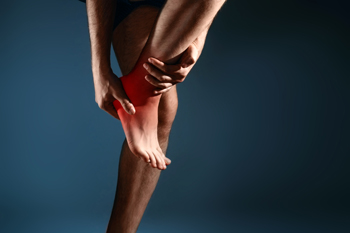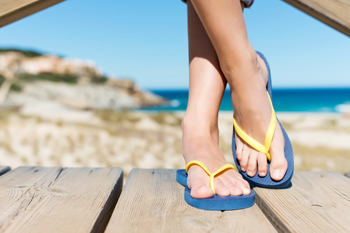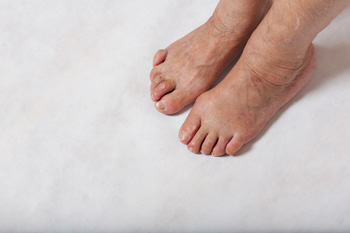Items filtered by date: February 2019
Bunion Foot Surgery
 Foot surgery can sound intimidating, but it is actually common among those with foot complications. There a few common issues that when severe enough, can lead to foot surgery. Bunions are one of these issues. Usually, bunions can be treated in ways that do not require surgery, but there are some instances where surgery is the best option to alleviate the uncomfortable or painful symptoms associated with bunions. Bunions result in a protrusion under the big toe, this protrusion is caused by the joint under the big toe bending and becoming deformed. High heels are a common cause for bunions, because they contort these bones. The surgery for bunions is not too complicated, the surgeon performs an osteotomy, which is the straightening of the big toe and metatarsals. After the surgery is done, the recovery period is usually six weeks. If you are concerned about your bunion, then it is highly recommended that you speak with a podiatrist to learn about the right treatment options for you.
Foot surgery can sound intimidating, but it is actually common among those with foot complications. There a few common issues that when severe enough, can lead to foot surgery. Bunions are one of these issues. Usually, bunions can be treated in ways that do not require surgery, but there are some instances where surgery is the best option to alleviate the uncomfortable or painful symptoms associated with bunions. Bunions result in a protrusion under the big toe, this protrusion is caused by the joint under the big toe bending and becoming deformed. High heels are a common cause for bunions, because they contort these bones. The surgery for bunions is not too complicated, the surgeon performs an osteotomy, which is the straightening of the big toe and metatarsals. After the surgery is done, the recovery period is usually six weeks. If you are concerned about your bunion, then it is highly recommended that you speak with a podiatrist to learn about the right treatment options for you.
Foot surgery is sometimes necessary to treat a foot ailment. To learn more, contact Dr. Mark Gagnon of Advanced Podiatry. Our doctor will assist you with all of your foot and ankle needs.
When Is Surgery Necessary?
Foot and ankle surgery is generally reserved for cases in which less invasive, conservative procedures have failed to alleviate the problem. Some of the cases in which surgery may be necessary include:
- Removing foot deformities like bunions and bone spurs
- Severe arthritis that has caused bone issues
- Cosmetic reconstruction
What Types of Surgery Are There?
The type of surgery you receive will depend on the nature of the problem you have. Some of the possible surgeries include:
- Bunionectomy for painful bunions
- Surgical fusion for realignment of bones
- Neuropathy decompression surgery to treat nerve damage
Benefits of Surgery
Although surgery is usually a last resort, it can provide more complete pain relief compared to non-surgical methods and may allow you to finally resume full activity.
Surgical techniques have also become increasingly sophisticated. Techniques like endoscopic surgery allow for smaller incisions and faster recovery times.
If you have any questions please feel free to contact one of our offices located in Crestwood, Orland Park, and Summit, IL . We offer the newest diagnostic and treatment technologies for all your foot and ankle needs.
Causes of Ankle Pain
 Research has indicated there are several different forms of ankle pain. Many people will experience some type of ankle pain throughout their lives, and this may come from a variety of reasons. These may include medical conditions such as arthritis, or from an injury. Ankle sprains are considered to be one of the most common forms of ankle pain, and this typically occurs when the ligaments in the ankle and surrounding areas are overstretched. This may happen as a result of tripping or falling, which may cause the ankle to roll inward toward the ground. Other reasons patients may have ankle pain may include infections in the joints of the ankle, nerve damage, or blood vessels that may be blocked. When ankle pain is first noticed, it’s important to rest the foot by taking the weight off of it. If it appears swollen, elevation may bring a mild form of relief. Please consult with a podiatrist who can properly guide you toward feeling better.
Research has indicated there are several different forms of ankle pain. Many people will experience some type of ankle pain throughout their lives, and this may come from a variety of reasons. These may include medical conditions such as arthritis, or from an injury. Ankle sprains are considered to be one of the most common forms of ankle pain, and this typically occurs when the ligaments in the ankle and surrounding areas are overstretched. This may happen as a result of tripping or falling, which may cause the ankle to roll inward toward the ground. Other reasons patients may have ankle pain may include infections in the joints of the ankle, nerve damage, or blood vessels that may be blocked. When ankle pain is first noticed, it’s important to rest the foot by taking the weight off of it. If it appears swollen, elevation may bring a mild form of relief. Please consult with a podiatrist who can properly guide you toward feeling better.
Ankle pain can be caused by a number of problems and may be potentially serious. If you have ankle pain, consult with Dr. Mark Gagnon from Advanced Podiatry. Our doctor will assess your condition and provide you with quality foot and ankle treatment.
Ankle pain is any condition that causes pain in the ankle. Due to the fact that the ankle consists of tendons, muscles, bones, and ligaments, ankle pain can come from a number of different conditions.
Causes
The most common causes of ankle pain include:
- Types of arthritis (rheumatoid, osteoarthritis, and gout)
- Ankle sprains
- Broken ankles
- Achilles tendinitis
- Achilles tendon rupture
- Stress fractures
- Bursitis
- Tarsal tunnel syndrome
- Plantar fasciitis
Symptoms
Symptoms of ankle injury vary based upon the condition. Pain may include general pain and discomfort, swelling, aching, redness, bruising, burning or stabbing sensations, and/or loss of sensation.
Diagnosis
Due to the wide variety of potential causes of ankle pain, podiatrists will utilize a number of different methods to properly diagnose ankle pain. This can include asking for personal and family medical histories and of any recent injuries. Further diagnosis may include sensation tests, a physical examination, and potentially x-rays or other imaging tests.
Treatment
Just as the range of causes varies widely, so do treatments. Some more common treatments are rest, ice packs, keeping pressure off the foot, orthotics and braces, medication for inflammation and pain, and surgery.
If you have any questions, please feel free to contact one of our offices located in Crestwood, Orland Park, and Summit, IL . We offer the newest diagnostic and treatment technologies for all your foot care needs.
Possible Dangers of Wearing Flip Flops
 While flip flops are easy to slip into, they may not be the best for your feet. This may be due to inadequate support, and uncomfortable foot conditions may develop as a result of this. These open back shoes may cause a condition known as fissures o the heels to develop, in addition to possible injuries to the Achilles tendon. As they are worn, the toes may have a tendency to tense, which may be a natural reaction to ensure they are stable in the shoe. Additionally, the band of tissue that is referred to as the plantar fascia may become injured, and this may typically cause severe pain and discomfort. Blisters may be a common occurrence while wearing flip flops, and this may often be a result of excessive friction caused by rubbing that occurs between the toes. If you are experiencing any foot pain that may have been caused by wearing flip flops, it is suggested to consult with a podiatrist who can properly treat any foot condition.
While flip flops are easy to slip into, they may not be the best for your feet. This may be due to inadequate support, and uncomfortable foot conditions may develop as a result of this. These open back shoes may cause a condition known as fissures o the heels to develop, in addition to possible injuries to the Achilles tendon. As they are worn, the toes may have a tendency to tense, which may be a natural reaction to ensure they are stable in the shoe. Additionally, the band of tissue that is referred to as the plantar fascia may become injured, and this may typically cause severe pain and discomfort. Blisters may be a common occurrence while wearing flip flops, and this may often be a result of excessive friction caused by rubbing that occurs between the toes. If you are experiencing any foot pain that may have been caused by wearing flip flops, it is suggested to consult with a podiatrist who can properly treat any foot condition.
Flip-flops are not always the best choice of footwear. If you have any concerns about your feet or ankles, contact Dr. Mark Gagnon from Advanced Podiatry. Our doctor will assist you with all of your foot and ankle needs.
Flip-Flops and Feet
When the weather starts warming up, people enjoy wearing flip-flops. Flip-flops are comfortable, stylish, and easy to slip on and off; they're perfect for any summer beach goer. However, these shoes can cause harm to the feet.
How Can Flip-Flops Affect Me Long-Term?
- Ankle problems
- Hip problems
- Lower back problems
- Pain in the balls of the feet
- Problems with foot arches
- Changes in the way you walk
Are There Injuries Associated with Flip-Flops?
Yes. Since flip-flops are relatively weak and do not provide the same amount of support as sneakers, people who wear flip-flops regularly are more susceptible to injuries. On top of that, the open nature of the shoe makes your feet more prone to other problems, such as cuts and even infections. Common injuries and ailments include:
- Sprained ankles
- Blisters
- Infections
- Cuts and Scrapes
I like Wearing Flip-Flops. Are There Safe Alternatives?
When buying flip-flops, try to find ones that have sturdy soles and that are made of high-quality materials that will support for your feet. These flip-flops will cost more but will also last longer as a result.
If you have any questions please feel free to contact one of our offices located in Crestwood, Orland Park, and Summit, IL . We offer the newest diagnostic and treatment technologies for all your foot and ankle needs.
Painful Joints May Be Indicative of Rheumatoid Arthritis
 There are many patients who are afflicted with rheumatoid arthritis who may experience discomfort in the big toe, in addition to painful ankles and joints. This may result in difficulty in walking, which may hinder completing daily activities. There are specific conditions that may develop if rheumatoid arthritis is present, and these include the formation of bunions, hammertoe, or plantar fasciitis. Additionally, it may be beneficial to wear shoes that fit properly which have adequate room for the toes to move about in. This may put less pressure on the joints in the toes, and a moderate level of relief may be attained. Research has indicated there may be measures that can be implemented to reduce a portion of the pain and discomfort that is associated with this condition, and these include maintaining a healthy body weight, avoiding standing for the majority of the day, and engaging in a massage or warm foot bath. If you have symptoms of rheumatoid arthritis, it is strongly advised to speak to a podiatrist who can properly guide you toward proper treatment.
There are many patients who are afflicted with rheumatoid arthritis who may experience discomfort in the big toe, in addition to painful ankles and joints. This may result in difficulty in walking, which may hinder completing daily activities. There are specific conditions that may develop if rheumatoid arthritis is present, and these include the formation of bunions, hammertoe, or plantar fasciitis. Additionally, it may be beneficial to wear shoes that fit properly which have adequate room for the toes to move about in. This may put less pressure on the joints in the toes, and a moderate level of relief may be attained. Research has indicated there may be measures that can be implemented to reduce a portion of the pain and discomfort that is associated with this condition, and these include maintaining a healthy body weight, avoiding standing for the majority of the day, and engaging in a massage or warm foot bath. If you have symptoms of rheumatoid arthritis, it is strongly advised to speak to a podiatrist who can properly guide you toward proper treatment.
Because RA affects more than just your joints, including the joints in your feet and ankles, it is important to seek early diagnosis from your podiatrist if you feel like the pain in your feet might be caused by RA. For more information, contact Dr. Mark Gagnon of Advanced Podiatry. Our doctor will assist you with all of your podiatric concerns.
What Is Rheumatoid Arthritis?
Rheumatoid Arthritis (RA) is an autoimmune disorder in which the body’s own immune system attacks the membranes surrounding the joints. Inflammation of the lining and eventually the destruction of the joint’s cartilage and bone occur, causing severe pain and immobility.
Rheumatoid Arthritis of the Feet
Although RA usually attacks multiple bones and joints throughout the entire body, almost 90 percent of cases result in pain in the foot or ankle area.
Symptoms
- Swelling and pain in the feet
- Stiffness in the feet
- Pain on the ball or sole of feet
- Joint shift and deformation
Diagnosis
Quick diagnosis of RA in the feet is important so that the podiatrist can treat the area effectively. Your doctor will ask you about your medical history, occupation, and lifestyle to determine the origin of the condition. Rheumatoid Factor tests help to determine if someone is affected by the disease.
If you have any questions please feel free to contact one of our offices located in Crestwood, Orland Park, and Summit, IL . We offer the newest diagnostic and treatment technologies for all your foot and ankle needs.
